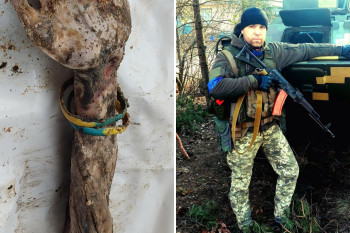Father loses 5 family members to Russian airstrike: ‘They were killed physically. I was killed mentally with them’
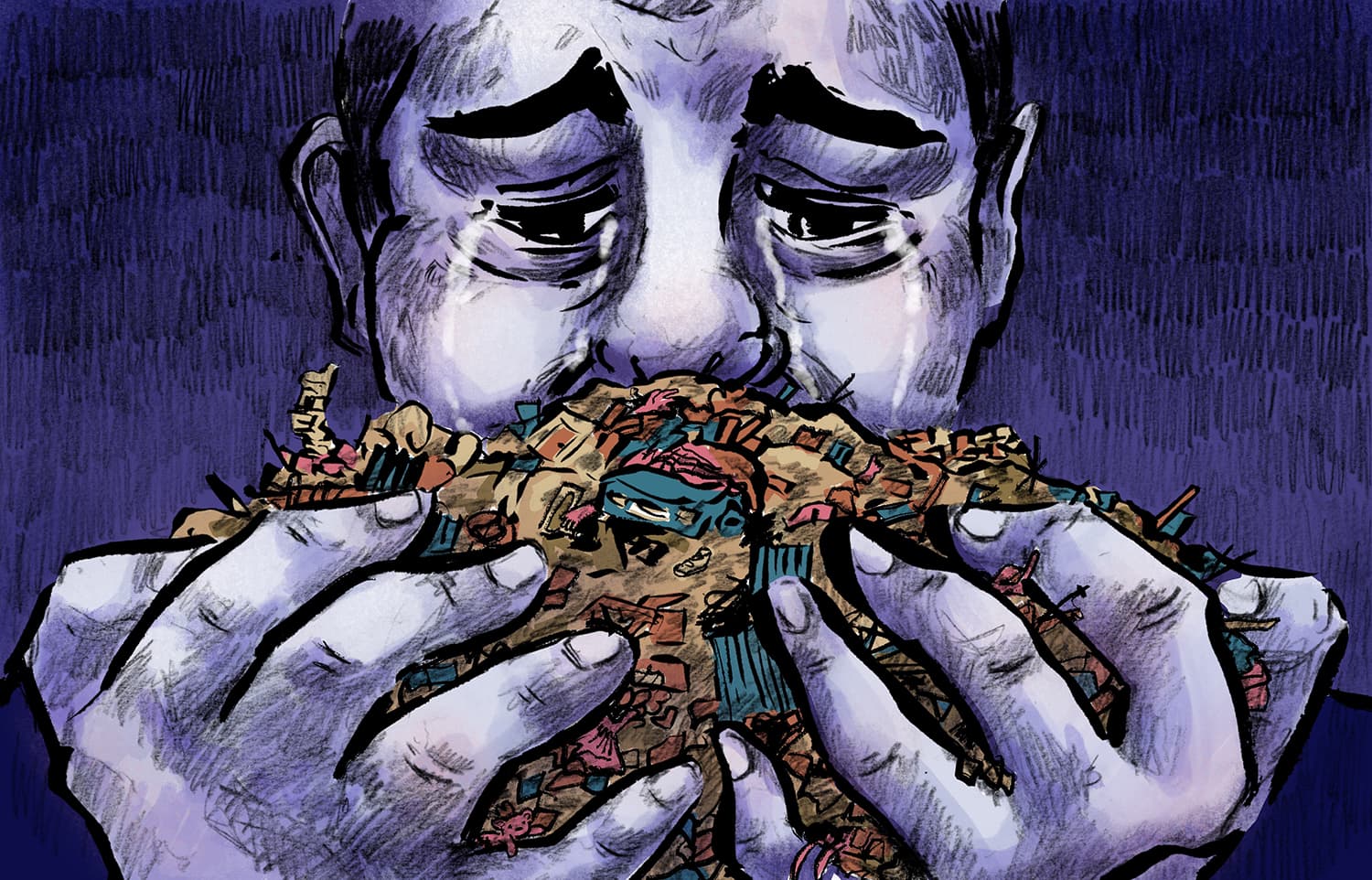
Volodymyr Obodzinskyi was at work when a sudden call from his neighbor in Zhytomyr Oblast shook him to his core.
"There were loud explosions somewhere around your house just now," the neighbor told him.
At the time, Obodzinskyi worked in Kyiv, about 100 kilometers away from his home, the village of Yurivka.
Aghast, he started calling his family immediately. He was gripped by fear when neither his wife nor his children picked up their phones, which "has never happened before," he says.
Obodzinskyi then called his parents, who live nearby, and urged them to head to his family’s home immediately.
The ground fell out from underneath Obodzinskyi's feet when he heard his mother screaming on the phone about 20 minutes later.
"Son, there is no house. They are all dead," Obodzinskyi heard his father saying.
That night on March 8, Obodzinskyi's 40-year-old wife, 19-year-old daughter, 14-year-old son, and two grandchildren, both one year old, were killed in Russia's brutal airstrike on Yurivka.
Two 500-kilogram bombs were dropped on the village and left nothing but ruins of the house once filled with the laughter and joy of Obodzinskyi's family. He says there were no nearby military facilities that could have been potential targets.
In just one moment, Russia destroyed his cherished life by killing the people he loved.
"We had a happy life," he says as tears roll down his face. "It's all gone now."
According to the UN, Russia's war against Ukraine has killed at least 5,996 civilians and injured at least 8,848 as of Sept. 26.
Ukraine's Prosecutor General's Office said 10 people were killed by Russian airstrikes on Zhytomyr Oblast that day: "Half of them were my family," says Obodzinskyi.
The life they had
Obodzinskyi was in his early 20s when he met the love of his life, his future wife, Nataliia. He says he instantly felt that she was "his person." The two married precisely seven months and seven days after meeting each other.
The life they built together was abundant with happy moments, love, and mutual respect, Obodzinskyi says.
In two years, their first daughter Ivanna was born. Five years later, the family's happiness doubled when Nataliia gave birth to their long-awaited son, whom they named after Volodymyr.
They built their two-storied house in Yurivka for nearly a decade, and it became a warm and welcoming home, hosting family celebrations and quiet evenings with relatives and close friends.
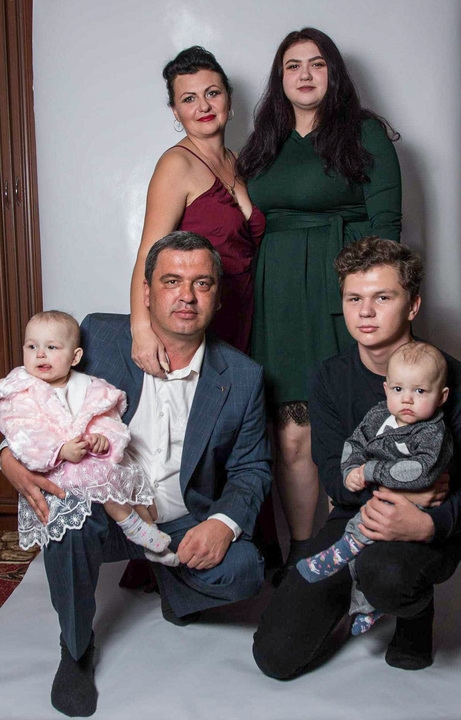
The family had a small garden. They were growing some grapes and lots of bright-colored flowers.
Both Obodzinskyi and his wife worked hard to provide for their children. For the last six years, 42-year-old Obodzinskyi worked at a security company in Kyiv, back and forth from his home and the capital every few days. Nataliia taught history and Ukrainian language at a school in Zhytomyr Oblast.
Despite her busy schedule, she always made time for some creative artwork. Obodzinskyi says their house was adorned with many of her embroidered paintings. None of them survived the airstrike.
It has only been a year since Volodymyr and Natallia became grandparents. In January 2021, their daughter Ivanna gave birth to twins — Denys and Nikol. While Ivanna soon left her husband and moved back in with her parents, Obodzinskyi says they were beyond happy to live together and see their dearest grandchildren grow up.
They also traveled often, spontaneously going on tours and one-day trips around Ukraine. They went to Egypt to celebrate the past New Year’s, Nataliia's first-ever trip abroad.
Life seemed only to be getting better, Obodzinskyi says. But that was before Russia's all-out war began.
"As long as I live, it will be painful to recall how happy we were," he says, crying.
Last goodbyes
The start of Russia's full-scale invasion on Feb. 24 took the family by surprise.
Obodzinskyi was called to work that morning, even though it was his day off. He went to the grocery store to stock up on food for his family and then took a train to the Kyiv suburbs at around 2 p.m. He took the last train that went in the direction of Irpin and Borodianka in Kyiv Oblast. Russian troops soon occupied both towns.
Obodzinskyi says he hugged his children but had no chance to say goodbye to his wife. Natallia had gone on a walk with their grandchildren as he was leaving.
He could not comprehend that it would be the last time he would see his loved ones alive.
Although their village is around 115 kilometers south of the border with Belarus, whose territory Russia has been using to launch attacks on Ukraine, it was relatively quiet there before March 8.
There were shortages of some goods at stores in Yurivka due to the Russian occupation of settlements in Kyiv Oblast, Obodzinskyi says. So just before his birthday on March 5, he sent his family plenty of food from Kyiv.
On March 7, his daughter Ivanna called him asking to come back sooner, saying that she missed him a lot. That night, Obodzinskyi saw his one-year-old grandchildren for the last time in a video call: He recalls how little Nikol waved her hand at him and how Denys made an impression of a hedgehog.
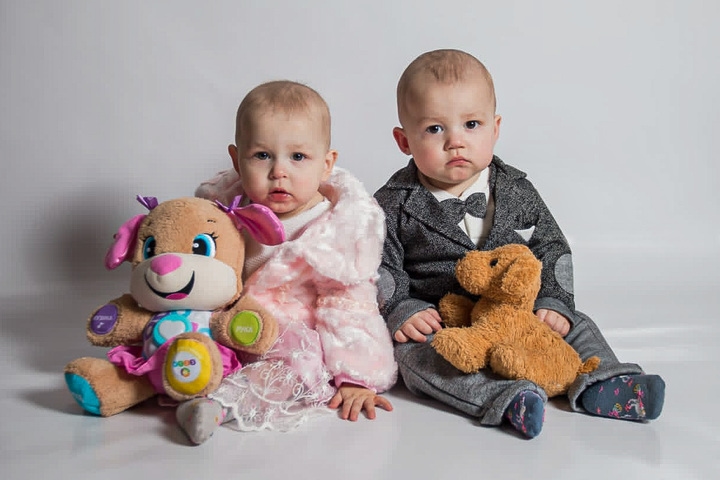
March 8 was the first International Women's Day that his wife and daughter did not get flowers from Obodzinskyi. He says it was impossible to arrange for any delivery.
He remembers being extremely anxious that day, "as if feeling something," and even asked his boss to let him go home for a couple of days. He got permission and even a car to drive back home but changed his mind after a call to his friend from the village: "He said everything was fine there; he calmed me down."
As usual, Obodzinskyi called his wife at around 8 p.m. to talk about their days.
"In about one hour, they were all gone," he says.
It won’t hurt less
When he heard his father say those terrifying words, Obodzinskyi turned his phone off and started screaming "hysterically." He spent the entire night crying.
Obodzinskyi headed to Yurivka as soon as the curfew ended at 7 a.m. The trip took him much longer than usual as he had to take alternative routes to avoid Russian occupiers in the area.
He says his heart broke into a thousand pieces when he saw what remained of his home.
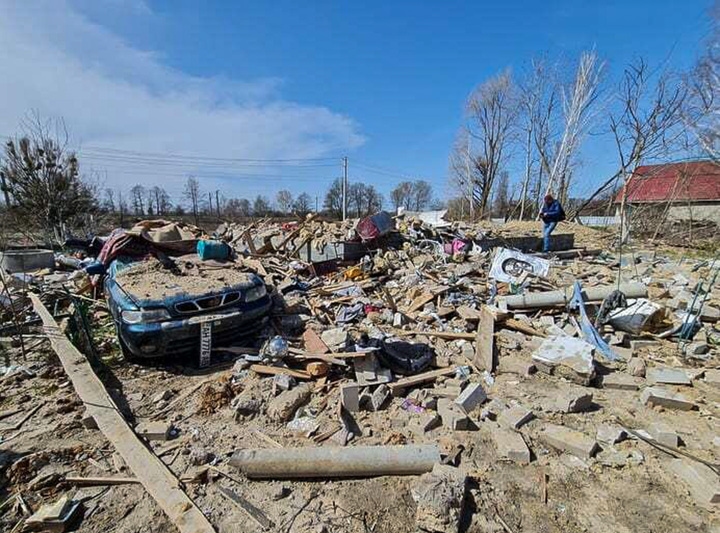
"What I saw there was pure horror," he says. "There was a funnel with a depth of six and a radius of 12 meters where my son's room was."
Another funnel-shaped hole was behind the barn in the garden, Obodzinskyi says.
At the morgue, he was forced to see what remained of the people he loved most.
"We couldn't bury them in open coffins," he says, as their bodies were severely mutilated.
The blasts were so powerful that the bodies of his one-year-old grandchildren were found 70 meters from the house. Rescue workers spent hours looking for them, Obodzinskyi says.
There was no place to bury his family members together at the cemetery in Yurivka, so they decided to do it at a cemetery in neighboring Malyn.
Obodzinskyi also left a place there for himself.
"They were killed physically. I was killed mentally with them," he says.
"No one will ever call me their dad or grandpa," he adds in tears.
It has been over six months since Russia took everything away from Obodzinskyi. He does not plan for the future and lives one day at a time. He spends all his time at work and goes to his family’s graves each week.

"All I want is to see our victory and set monuments (at the cemetery) for my family," Obodzinskyi says.
Seeking justice for his family’s murder, he filed an appeal to the International Criminal Court in the Hague with the assistance of a lawyer. Though Obodzinskyi wants those responsible for the crimes to be punished, he understands that "nothing will ever bring back" his family.
"It won't hurt less," he says.

